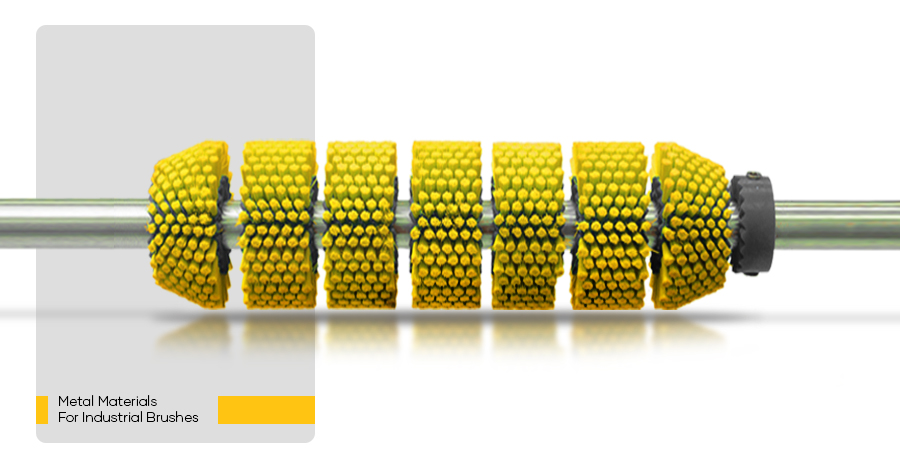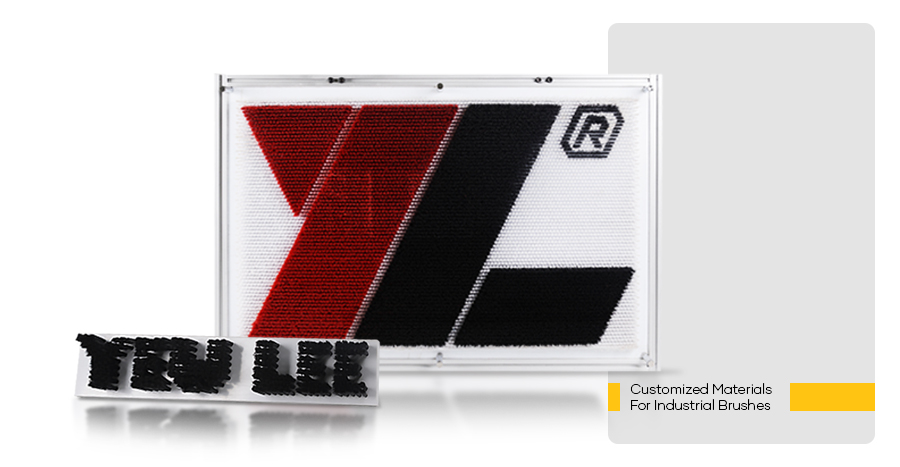How To Choose Suitable Materials For Industrial Brushes

There are different types of materials for industrial brushes that cater to several needs. The brush fill is the core working surface, and cleaning action frequently exposes it to strong impact and chemicals. So, picking a material that suits your cleaning needs is essential. It ensures your brush’s longevity and efficiency. Here we elaborately talk about the properties and uses of materials in various types of industrial brushes.
Materials For Industrial Brushes
You can choose monofilament materials from three categories: synthetic polymers, metal, and natural. Each material type has properties that make them suitable for more specific functions.
Synthetic Polymer Materials For Industrial Brushes

There are different kinds of synthetic polymer materials for industrial brushes. Synthetic materials are artificial polymers that are strong, durable, and resistant to wet or dry conditions. They generally do not absorb much water and are an excellent brush fill. Yew Lee Pacific offers eight synthetic polymer materials.
Nylon is a versatile monofilament material. It’s resilient, flexible, elastic, and can withstand extreme heat and chemicals. Due to its strength, nylon is the most commonly used bristle material for industrial brushes.
Regular nylon is tough and flexible, with excellent bend recovery and elasticity. It is heat and abrasion-resistant, with limited resistance to most common industrial chemicals. It has a higher moisture absorption rate and tends to feel softer in wet and humid conditions. Its versatility suits a wide variety of brush applications. You can use regular nylon for washing, cleaning, and polishing surfaces. This brush material is widely used in the medical and food industries, although many other manufacturing industries also use them.
Abrasive nylon contains abrasive grit on the tips and lateral surfaces of the entire monofilament length. Abrasive grit can be made of silicone carbide, aluminum oxide, or aluminum silicate, depending on the desired abrasiveness. Abrasive nylon self-sharpens as the bristle wears with use, extending its longevity. It’s an ideal monofilament material for deburring or surface finishing because it polishes without damaging the workpiece.
Fire Retardant Nylon is non-toxic nylon with high heat and fire resistance. It offers an excellent flame-retardant effect to prevent or reduce the spread of fires. When in contact with fire, this material produces less smoke and doesn’t produce toxic fumes. It’s suitable for escalator brushes, door seals, and gutter brushes. You can use smaller variants for household cleaning equipment like vacuum cleaners.
Antistatic nylon is a conductive, high-carbon bristle material used for antistatic brushes. It is usually a type 6.6. nylon medium that is static-free and does not absorb dust. This material reduces the impact of electrostatic discharge that could damage sensitive electrical components. It ensures safety during the production process. Antistatic nylon has high conductivity and corrosion resistance, making it ideal for electronics manufacturing industries. It is also widely used for antistatic brushes in elevator doors, windows, and cleanrooms.
Polybutylene Terephthalate (PBT) has excellent strength, toughness, and fatigue resistance. It can also withstand high-impact, harsh chemicals and abrasion. It does not absorb much water and resists bacterial and fungal growth. Thus, it is suitable for making industrial and outdoor cleaning brushes for regular application in wet conditions. You can also choose this material for household cleaning, painting, personal toothbrushes, and even for make-up brushes.
Polyether Ether Ketone (PEEK) is a durable thermoplastic polymer with high fatigue, rigidity, and heat resistance. It is an excellent flame retardant and is chemically stable. You can choose it for regular brush applications in corrosive, high-temperature conditions. PEEK is suitable for making industrial brushes or high-grade hairbrushes.
Polyethylene Terephthalate (PET) is a flexible, durable material with extreme toughness. It is suitable for brush applications that don’t need abrasive action. PET has good chemical, elemental, and weather resistance. The physical and mechanical performance of brushes made with PET remains high even at higher temperatures. This material is ideal for household washing and polishing due to its non-abrasive properties. You can use PET for household cleaning, painting, and personal make-up brushes.
Polypropylene (PP) is an affordable synthetic polymer that does not absorb much water and has outstanding chemical stability and resistance. It has excellent mechanical properties and resists chemicals, bacteria, and fungi build-up. You can use this material for road sweeping brushes, household cleaning and sanitation brushes, and personal care brushes. It is also widely used for commercial cleaning, car washing, and sanitation industries.
Metal Materials For Industrial Brushes

Metals are strong, durable, and resistant to wet or dry conditions. They have high tensile and fatigue strength and are resistant to corrosion. Metal bristles are harder with higher rigidity and are great for polishing, deburring, burnishing, and cutting. Yew Lee Pacific offers two different subtypes of nylon materials for industrial brushes.
Stainless steel has excellent corrosion and heat resistance. It’s frequently applied in corrosive environments for general cleaning, deburring, polishing, and rust removal. When used in a high-density or large brush fill, stainless steel is abrasive and provides aggressive brushing action. Yew Lee Pacific can use stainless steel to make wire brushes for polishing and deburring in the wood and metalworking industries. It’s ideal for brush applications in high-temperature and humid conditions, such as heavy industrial manufacturing. They are also excellent monofilament materials for medical and food processing brushes.
Brass is one of the softest metal fibers for industrial brushes. It’s excellent for light to medium-intensity cleaning or gentle polishing and luster finishing. Softer brass bristles help remove excess material without damaging the workpiece or surface. Brass is also conductive and resistant to sparks and corrosion. It’s fire-resistant and suitable for potentially explosive conditions as a safe alternative to steel.
Yew Lee Pacific Offers Customized Materials For Industrial Brushes

Yew Lee Pacific provides ten different synthetic polymer and metal monofilament materials for industrial brushes. You can choose any of these materials to make your custom brush for industrial cleaning and polishing needs. Specify the material type you want in our online design form and submit it to us. We’ll use the materials that you choose to custom-make industrial brushes that meet your needs.

